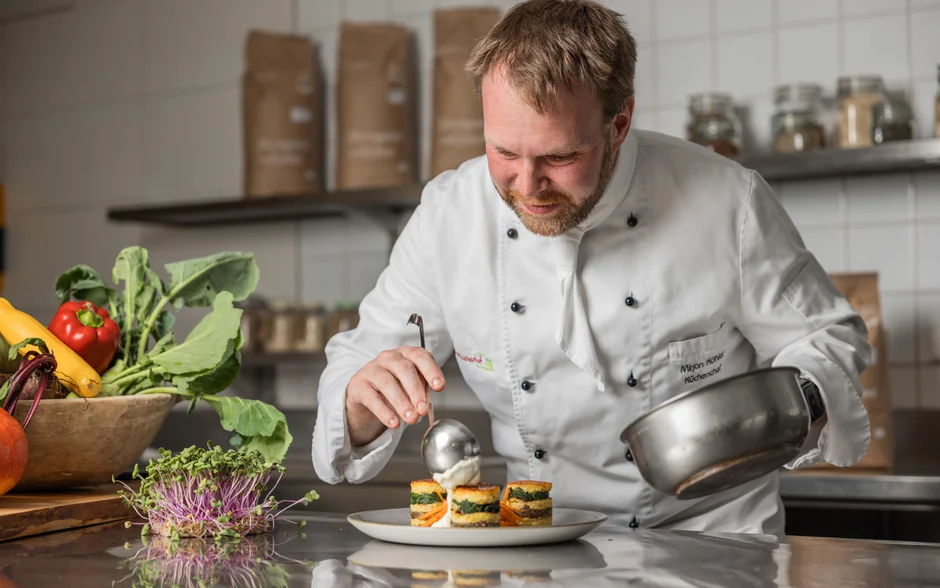100 per cent organic food
It has been more than a decade since the first hoteliers switched to organic food. At the time, they were ridiculed and often dismissed as eco-freaks. Today, it is clear that these visionaries of the organic movement, including Otto Wandl, backed the right horse. Chef Mirjan Köhler has been working at the BIO Hotel Leutascherhof for 17 years and today he chats a little about organic cuisine.
‘I was already at the Leutascherhof before the switch to 100 percent organic food, but even before that we mainly used regional products. That was always very important to the Wandl family,’ says Mirjan. The meat supplier was never anything other than organic, and even the chickens, which have come from Leutasch for many years, had never experienced the ‘blessings’ of modern agriculture. The difference is that these farms, like all other organic suppliers, are now certified. ‘The baker has even switched to organic for the Leutascherhof!’, says Mirjan, not without pride.
Mirjan Köhler in conversation: How do you manage an organic kitchen?
Dear Mirjan, what challenges do you face when shopping?
Yes, that's a very crucial and also challenging point. Fruit and vegetables, for example, are only delivered twice a week. We have to order special products two weeks before delivery. This means that we have to know exactly what seasonal produce we can expect and how to plan our menu. However, we also have many small suppliers at the Leutascherhof, such as farmers from Leutasch, who supply us with meat and potatoes.
What are the requirements for cooking and processing?
We make almost everything ourselves in our organic kitchen, including stuffed pasta, gnocchi and pesto. We just have to be very flexible in our response to what is available. In winter, the fruit selection mainly consists of apples, pears and oranges; until two years ago, pineapples were not available in organic quality at all.
How do guests actually benefit from all the extra effort involved in organic farming?
The quality of the food is definitely higher, especially when it comes to meat, where even a layman can notice the significantly better taste. The products are purer and more natural; there is nothing highly bred. The discussion on climate protection is very intense at the moment, and I have to say that organic farmers and organic hoteliers are actively contributing to the protection of the earth and the climate. The soil and water remain clean and the carbon footprint of the products is significantly lower. So we all benefit!
How much do organic foods cost compared to conventional products?
Organically produced foods are on average about a third more expensive than conventionally produced products. The effort involved is greater, the yield is often lower, but the quality is many times higher. The question we need to ask ourselves is: aren't conventional foods too cheap? Can we expect our health to tolerate inferior nutrition? Of course, everyone has to answer that question for themselves. At the Leutascherhof, it's clear what we've decided.
What do you see as the main difference when it comes to handling organic food?
The big issue is and remains availability. You have to think ahead and order in good time; that's actually the main difference when you run an organic kitchen. You also have to change some recipes and adapt them to organic products. And last but not least, it's very important to always pay attention to the season.
Dear Mirjan, thank you very much for the interesting conversation!
Has reading this made you want to try Mirjan Köhler's delicious organic cuisine for yourself? Spring is just around the corner, bringing with it the first fresh harvest of crisp lettuce, aromatic herbs and healthy vegetables.



